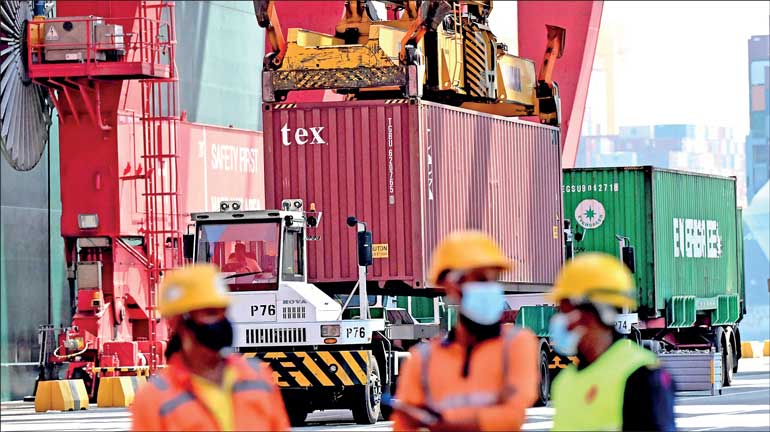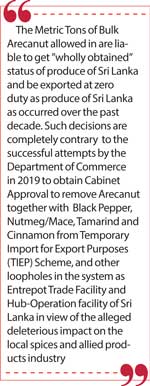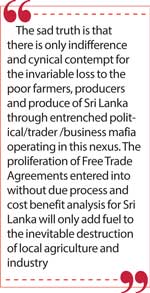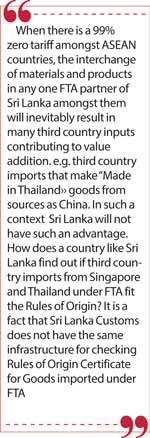Tuesday Feb 17, 2026
Tuesday Feb 17, 2026
Thursday, 19 September 2024 00:20 - - {{hitsCtrl.values.hits}}

 In the run up to the Presidential Elections, what is very visible to the public eye are the many incentives, bribes/handouts, gifting of lands, housing, increased Aswesuma payments, jobs, write off of farmer debts, salary increases, PAYE tax reductions. “You name it and you get it” kind of inducements are given to all and sundry. This is practically at the expense of the people and the scarce resources of a bankrupt and indebted nation.
In the run up to the Presidential Elections, what is very visible to the public eye are the many incentives, bribes/handouts, gifting of lands, housing, increased Aswesuma payments, jobs, write off of farmer debts, salary increases, PAYE tax reductions. “You name it and you get it” kind of inducements are given to all and sundry. This is practically at the expense of the people and the scarce resources of a bankrupt and indebted nation.
This article attempts to expose the more insidious and hidden opportunities given to traders and their political supporters alike for circumvention and fraud to thrive in international trade. This is particularly so since it is on the eve of the elections that the Presidential Candidate who is also the Head of the Finance Ministry has decided to restore some of the concessions hitherto subject to malpractice, misuse and abuse in the import of items for purported value addition and re-export under certain Free Trade Agreements.
The Gazette Extraordinary No. 2387135 dated June 06,2024, has been published to allow approved enterprises specified in the Regulation No. 4 of the Gazette to import Areca Nuts classified under the HS Code 0802.80.90 subject to an Import Control License (Bulk Licence), for the purpose of process, and re-export under HS Codes approved by Sri Lanka Customs, with a minimum of 35% of local value addition in terms of the ‹Procedure: Areca Nuts Processing Industry for Re-Export Purposes, as approved by the Cabinet of Ministers by the decision No.23l0585/631/008-1 dated 27 March 2023.»
Eight Companies are selected by the Government for bulk import of Arecanuts for re-export under Free Trade Agreements (Cabinet Decision dated 26/06/24 No: 23/1082/631/008-11) It appears that these companies are trying to produce for export under the India Sri Lanka Free Trade Agreement, and get Certificates of Origin for a mouthwash and/ or Betel chewing Arecanut product called “Supari,” “Paan Masaala” which has been banned in some Indian States for health reasons. Meanwhile, the Metric Tons of Bulk Arecanut allowed in are liable to get ”wholly obtained” status of produce of Sri Lanka and be exported at zero duty as produce of Sri Lanka as occurred over the past decade.
Such decisions are completely contrary to the successful attempts by the Department of Commerce in 2019 to obtain Cabinet Approval to remove Arecanut together with Black Pepper, Nutmeg/Mace, Tamarind and Cinnamon from Temporary Import for Export Purposes (TIEP) Scheme, and other loopholes in the system as Entrepot Trade Facility and Hub-Operation facility of Sri Lanka in view of the alleged deleterious impact on the local spices and allied products industry. (Cabinet Paper No:19/0525/133/015 dated 31/01/2019). For the first time in history, the origin of this illicit trade was stopped at its tracks with instructions given to Sri Lanka Customs to control illegal transhipment too. It is also despite the fact that a joint investigation of the Directorate of Revenue Intelligence, Ministry of Finance, India and the Department of Commerce Sri Lanka in July 2019 submitted extensive detailed evidence to their respective legal authorities on the fraudulent issue of a large number of Certificates of Origin on Arecanut and Pepper that were immediately cancelled by these two respective government organisations.
It is time that the general public understood that these corrupt shenanigans between government policy/regulation changes are not merely about Arecanuts, small change, commission deals, but large scale multimillion dollar money spinners for both traders, and henchmen of the politicians. These may well constitute the largest component of the undeclared election Budget of a contender and have a fundamental financial clout on the voter base and thereby on election results.
‘Temporary Import for Export Purpose’ becoming permanent
 This project initiated in 2012 by former SLPP/current SJB Ministers (viz.M/s Rishad Bathiudeen, Mahinda Yapa Abeywardena, Reginald Cooray, and Jagath Pushpakumara) introduced a new method of trading aimed at earning foreign exchange to Sri Lanka through temporary import of plant production and re-exporting the same with value addition under Free Trade Agreement. In reality, this has a dubious and chequered history todate. What was euphemistically called “Temporary Import for Export Purpose” became permanent Imports substituted fraudulently for locally produced goods as Sri Lanka exports. Even a daughter of a former prominent Cabinet Minister holding a Logistics Transport Holdings Company is said to be prominently in the business today and granted a selected bulk importer status.
This project initiated in 2012 by former SLPP/current SJB Ministers (viz.M/s Rishad Bathiudeen, Mahinda Yapa Abeywardena, Reginald Cooray, and Jagath Pushpakumara) introduced a new method of trading aimed at earning foreign exchange to Sri Lanka through temporary import of plant production and re-exporting the same with value addition under Free Trade Agreement. In reality, this has a dubious and chequered history todate. What was euphemistically called “Temporary Import for Export Purpose” became permanent Imports substituted fraudulently for locally produced goods as Sri Lanka exports. Even a daughter of a former prominent Cabinet Minister holding a Logistics Transport Holdings Company is said to be prominently in the business today and granted a selected bulk importer status.
A factual example of how this scam is operated is as follows: Under the India Sri Lanka Free Trade Agreement, (ISLFTA) Rules of Origin, Arecanuts and spices are eligible to be exported to India under duty free/reduced as “wholly obtained” or entirely produced in Sri Lanka. However, if they are not completely produced in Sri Lanka, they cannot be exported as Arecanuts or Spices under the ISLFTA. They can be eligible to be exported under ISLFTA under a different tariff classification and only if such production process has been achieved with a minimum 35% Domestic Value Addition together with a product transformation at the H.S. 4 digit level through a sufficient working process taking place in Sri Lanka. Then they cease to be eligible for zero duty as “wholly obtained” Arecanut” since they are exported under another Tariff Classification H.S. which completely changes their form and name.
What really happened under these manipulations of the traders/politicians mafia since 2012 to date was the incidence of cheap third country imports from Indonesia, Vietnam, Pakistan, Thailand passing off as wholly obtained produce of Sri Lanka in order to obtain import duty reductions for Spices and Arecanut under the FTA with India. This led to local producers getting poor value for their produce and imposition of various restrictions as floor price and onus on the importer to establish bona fide documentation under Indian new Customs regulations. The more genuine members of the Spices and Allied Products, Producers and Traders Association of Sri Lanka and local producers have together with the Department of Commerce, repeatedly agitated against the serious fraud and circumvention of Rules of Origin in Free Trade Agreements that had already affected Sri Lanka Arecanuts, Cloves, Cardamoms, Tamarind, Pepper etc resulting in lower farmgate prices for local producers.
It is apparent that there is no scientifically proven processing technology within Sri Lanka to make Arecanut a different product by substantial value added or transformation process like essential oil or soap. Consequently, the traders who imported the bulk Arecanut/Spices passed them off as “wholly obtained” or produced in Sri Lanka under duty free status of the Free Trade Agreements. Once the imported products are brought in fraudulently purporting to be Temporary Imports for Export Purpose (TIEP) the certifying authorities find it near impossible to differentiate the local product from the imported produce which is exported as “wholly obtained” in Sri Lanka since a well-entrenched web of political, business and government administrative support surround this re-export mafia.
Moreover, the joint inspection by the technical teams of the various regulatory authorities of the Government based on samples drawn from every consignment of imported Arecanut/spices to protect local agriculture from microbiological contamination or infection remains severely compromised due to down the line special and vested business and political pressures. Sri Lanka’s legislation on Plant Protection, Flora and Fauna Act that protects the local coconut cultivation by prohibiting the import of palm genus trees and their products as Arecanut is thrown to the marauding wolves of illegal profit who compel the regulatory authorities to issue plant import permits to selected traders.
Trader/Politico mafia
 The public must be aware that this saga of fraud, deception and destruction of local production unfortunately does not end with the foregoing facts. It is merely the beginning of the end of carrying it forward to other third country imports masquerading as locally produced re-exports benefiting the unscrupulous trader and politician alike. It slips easily under the so-called export oriented economic strategy that is so glibly paraded by sitting politicians and some in the UNP/SJB with whom SLPP Ministers who initiated this TIEP related scam have joined forces.
The public must be aware that this saga of fraud, deception and destruction of local production unfortunately does not end with the foregoing facts. It is merely the beginning of the end of carrying it forward to other third country imports masquerading as locally produced re-exports benefiting the unscrupulous trader and politician alike. It slips easily under the so-called export oriented economic strategy that is so glibly paraded by sitting politicians and some in the UNP/SJB with whom SLPP Ministers who initiated this TIEP related scam have joined forces.
The people must mark well that the stage is set for further expansion of the Trader/Politico mafia into other products as well, from Arecanut to minor Export products, Tamarind, Ekel Brooms. Recent discussions are underway on proposed import of prawns and fisheries produce for re-export under Free Trade Agreements. There are a series of other allied actions taken by the present government that seem to consolidate and encourage third country imports to masquerade as local produce exports thereby misleading the public since exports are increasing statistically but impoverishing local producers and serving our competitors. Indonesia is a key source of illicit Arecanut and Coconut imports that are re-exported under Free Trade Agreement reduced duty purporting “wholly obtained” produced in Sri Lanka status. Urgent talks were held in Colombo during 15/16 July 2024 to enter into a Indonesia/Sri Lanka Preferential Trade Agreement (Ref. Cabinet Paper No:24/1522/631/039 dated 29/07/24). In the recently concluded FTA with Thailand for eg. Why has Sri Lanka liberalised the Rules of Origin for Thailand to be 40% DVA OR change of tariff subheading six digit level where as in other FTAs entered into by Sri Lanka with India, Singapore, it is value addition and change of tariff subheading 4 digit level ?
Sri Lanka’s total production of Export Agriculture Crops has ranged from an estimated 74,099 Metric Tons in 2014 to 101,792.9 Metric Tons in 2023 (Department of Export Agriculture). This includes Arecanuts, Cinnamon, other Spices, Cocoa, Coffee, Mace, Betel, Ginger and Turmeric. Are we entering into a phase of corrupt deals that will destroy the country’s potential to increase production and expand these crops?
More Free Trade Agreements
Consider the enormous interest and inordinate hurry of the politicians and their business henchmen to enter into more and more Free Trade Agreements ignoring the basic preparatory fundamentals viz. Preparation of Standard Preparatory Internal Feasibility Studies, Consultation/Transparency with all stakeholders and due process, Trade Complementaries, Supply Side Factors and Non-Tariff Barriers, Preparatory Trade Infrastructure in Services Negotiations, Rules of Origin on Preferential exports/imports, issues of Circumvention and Fraud, Asymmetries between FTA partners, etc.
The public must note how Presidential intervention resulted in the Department of Commerce being wound up, denied budgetary provisions and abolished and substituted with an outfit called International Trade Office under the President Ranil Wickramasinghe, Presidential Secretariat with a retired over 75 year old former Director General of Commerce functioning as Chief Negotiator for Free Trade Agreements assisted by an Addl. Secretary from the Presidential Secretariat serving as a Deputy Chief Negotiator. (Cabinet Decision Nos:23/1216/627/019 dated 24/7/23 and No. 24/0448/601/032 dated 4/3/24). Today, the Department of Commerce, a meritocracy of officials appointed by the Public Service Commission, holding Phd and Masters qualifications in International Trade exists only in name (due to legal action to restore it) since all their fundamental functions are vested with the politically created ITO whose Chairperson/Ambassador and Directors are all Presidential appointees as per the recently passed Economic Transformation Bill (Note to the Cabinet No:PS/NC/SAD/283/2024 dated 30/05/24 by President).
It is interesting to note that the newly created International Trade Office functioning under the President Ranil Wickremesinghe/Presidential Secretariat is taking a keen and close interest in the “business” of issuing Certificates of Origin under Free Trade Agreements. Recent action taken for Digitalization of Certificates of Origin is said to make the process easier for fraud and circumvention under the FTAs.
 It is in the above context that the current focus on entering into FTAs with Singapore, Thailand, Indonesia and 15 Regional Comprehensive Economic Partnership (RCEP) countries seems significantly injurious. These are countries which include the mega manufacturer China, which are competing with greater sophistication and competitiveness than Sri Lanka in producing the same exports as agriculture, garments, footwear which have ASEAN unified value added manufacturing and tariff systems by which it may be quite impossible to differentiate originating status under Rules of Origin (ROO) in a particular country which is Sri Lanka›s FTA partner. When there is a 99% zero tariff amongst ASEAN countries, the interchange of materials and products in any one FTA partner of Sri Lanka amongst them will inevitably result in many third country inputs contributing to value addition. e.g. third country imports that make “Made in Thailand›› goods from sources as China. In such a context Sri Lanka will not have such an advantage. How does a country like Sri Lanka find out if third country imports from Singapore and Thailand under FTA fit the Rules of Origin?
It is in the above context that the current focus on entering into FTAs with Singapore, Thailand, Indonesia and 15 Regional Comprehensive Economic Partnership (RCEP) countries seems significantly injurious. These are countries which include the mega manufacturer China, which are competing with greater sophistication and competitiveness than Sri Lanka in producing the same exports as agriculture, garments, footwear which have ASEAN unified value added manufacturing and tariff systems by which it may be quite impossible to differentiate originating status under Rules of Origin (ROO) in a particular country which is Sri Lanka›s FTA partner. When there is a 99% zero tariff amongst ASEAN countries, the interchange of materials and products in any one FTA partner of Sri Lanka amongst them will inevitably result in many third country inputs contributing to value addition. e.g. third country imports that make “Made in Thailand›› goods from sources as China. In such a context Sri Lanka will not have such an advantage. How does a country like Sri Lanka find out if third country imports from Singapore and Thailand under FTA fit the Rules of Origin?
It is a fact that Sri Lanka Customs does not have the same infrastructure for checking Rules of Origin Certificate for Goods imported under FTA. Unlike their Indian Rules of Origin Department of Foreign Trade counterpart which has several verifications against Sri Lankan exports, we generally have no verifications or physical checks on Indian imports under FTA. Clearly there is a high level conspiracy for promoting circumvention and fraud in a country that lacks the basic institutional infrastructure to correctly determine the country of origin status.
The fact that Free Trade Agreements are used as a springboard for such illicit and damaging activities is shown in the fact that sensitive decisions to enter FTAs are taken haphazardly behind closed doors of the Political Outfit, International Trade Office (ITO) without comprehensive consultation with industry and producers. Therefore the question that arises is why did successive governments since 2012 to date (with small exception in 2019 due to farmers agitation) adopt policies to aid fraudulent traders to misdeclare country of origin and avail undue duty concessions for exports originating from third countries as Vietnam, Indonesia, Thailand, China for tariff reductions due to Sri Lanka exports under existing FTAs as ISFTA, GSP+ etc.?
Obviously, the sad truth is that there is only indifference and cynical contempt for the invariable loss to the poor farmers, producers and produce of Sri Lanka through entrenched political/trader /business mafia operating in this nexus. The proliferation of Free Trade Agreements entered into without due process and cost benefit analysis for Sri Lanka will only add fuel to the inevitable destruction of local agriculture and industry. Corruption and nepotism in governance seems to be the bottom line of the much touted “Export Oriented Economy.”
(The writer holds B.A. (First Class) M.Sc LLB (Honours) London UK, Postgraduate Diploma in International Trade (GATT) Geneva.)